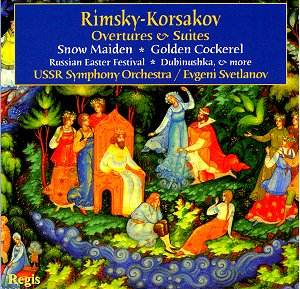I
am very pleased with Regis and so I suspect are most collectors.
Their connections with Vox, Unicorn, Collins and Russian sources
have produced a catalogue that offers rewards regardless of the
emphasis of your musical interests.
Not
a great deal to say about this collection except to comment on
its generosity and dazzlingly lit, sumptuous yet athletic approach.
Svetlanov takes the slow music at very broad tempi but never short-changes
you with a pedestrian approach. The music is iridescent with character
whether fairy tale fantasy or as in The Golden Cockerel,
a sardonic Prokofiev-like vein as in The Love of Three Oranges.
Speaking of the Cockerel, this reading is slightly more
subtle than the plush deep-pile of Ormandy's recording with the
Philadelphia on Sony Essential Classics. James Murray in his notes
mentions Stravinsky's debt to Rimsky (the dedicatee of Igor's
First Symphony) in The Firebird. However the atmosphere
is even closer in the slightly caustic writing of Le Rossignol.
The
digital clarity of Dubinushka and Cockerel contrasts
with the brightness, warmth and 'surface' of the analogue Snow
Maiden and Voyevoda tracks. Dance has quite
a bit of Borodin about it, while Nocturne and Bird's
Dance are luxuriant and Tchaikovskian (one can see where Ketèlbey
was coming from in the former). After these analogue 'badlands'
come the digital transparency and fancy-filled Pskov extracts.
Rimsky's predilection for vainglorious and faintly ridiculous
pomp reminds us of the Bax's less glorious moments - as in the
Coronation March and even Cortège and Rosc-Catha.
However Bax, whose weakness for Slav colour is well recognised,
is pre-echoed in the one non-theatrical track here. This is the
1888 Overture (written in the same year as the Capriccio
and Sheherazade) which stands head and shoulders above
the other works here in its concentration, motivic conviction
and cohesion. Only the highly inventive Cockerel movements
stand at all close to the overture in quality. Whether in swooning
orientalism or darting lively soloistic figures Svetlanov stands
high in the Overture stakes alongside the technicolor Stokowski
and the virtuoso Ormandy.
The
English-only notes give just enough of a flavour of the plot of
each opera Melodiya productions of which have appeared in full
on the Relief and Aura labels.
If
you are in the market for a selection of the theatre music this
is an unbeatable anthology stiffened by the Overture.
Rob
Barnett
